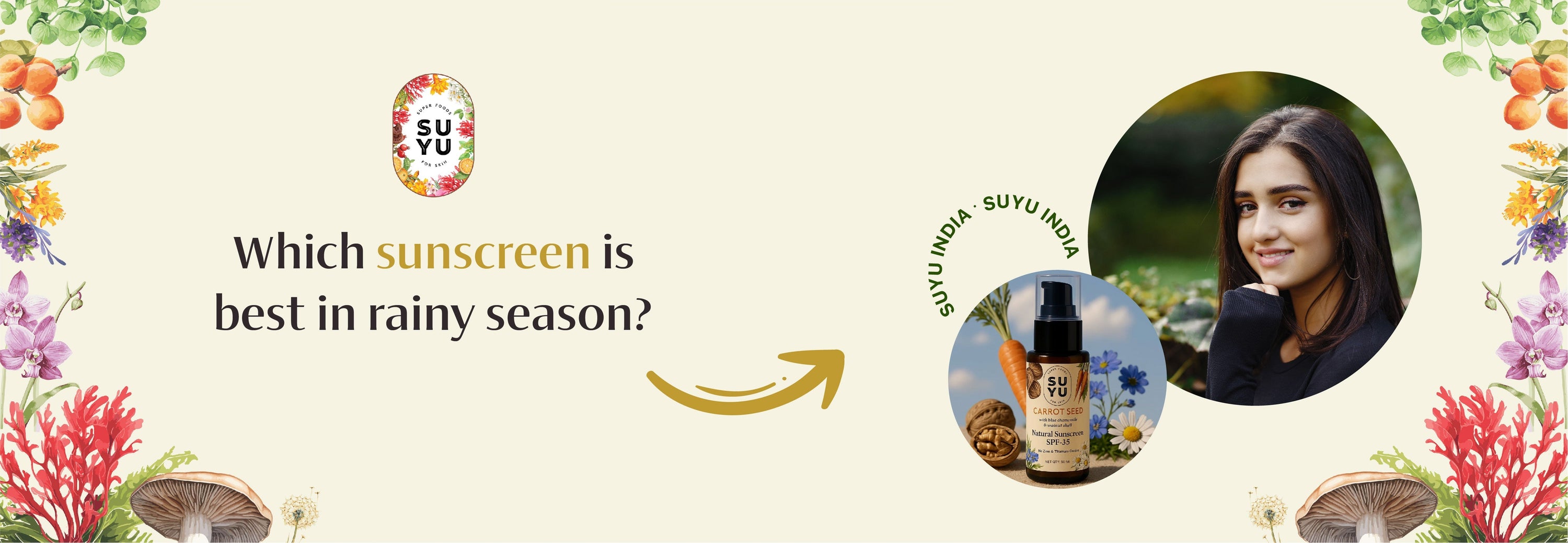
Which sunscreen is best in rainy season?
Introduction: Do You Need Sunscreen in the Rain?
Absolutely, yes. Rainy or cloudy weather may cool the air, but up to 80% of UV rays still reach your skin. In fact, UVA rays—the ones responsible for tanning, dark spots, and premature aging—can penetrate clouds and windows effortlessly.
Add high humidity, pollution, and sweat, and your skin faces a complex battle during the monsoon. For Indian and Asian women aged 28–55, this can mean:
-
Increased pigmentation
-
Dullness and dehydration
-
Breakouts from clogged pores
-
Sensitivity or rashes
Your defense? A natural sunscreen that protects without suffocating your skin.
The Hidden Harm of Chemical and Mineral Sunscreens
Chemical Sunscreens: What’s Wrong?
These contain lab-made filters like:
-
Oxybenzone
-
Avobenzone
-
Octinoxate
-
Octocrylene
They work by absorbing UV rays and converting them to heat. But studies now show:
-
Hormone disruption: Oxybenzone mimics estrogen
-
Skin irritation & allergies: Especially in sensitive skin
-
Absorption into bloodstream: Detected in urine and breast milk
-
Environmental harm: Linked to coral bleaching and marine toxicity
Mineral Sunscreens: Not Innocent Either
Although often promoted as “safe”, mineral sunscreens use zinc oxide or titanium dioxide. While they form a physical barrier on skin, research indicates:
-
Titanium dioxide nanoparticles, when inhaled or absorbed through damaged skin, may be carcinogenic
-
Zinc oxide can cause oxidative stress under sunlight
-
Both leave a chalky or grey cast—especially visible on deeper Indian skin tones
The Clean Alternative: Natural Sunscreens Without Chemicals or Minerals
Natural sunscreens work by using plant oils, extracts, and antioxidants that naturally reflect or absorb UV rays while nourishing the skin.
Nature’s UV-Protective Ingredients
-
Carrot Seed Oil
SPF rating between 35–40. Rich in beta-carotene and antioxidants, it helps protect, repair, and brighten.
-
Raspberry Seed Oil
Natural SPF of around 30–50. Offers protection from both UVA and UVB rays.
-
Shea Butter
Contains cinnamic acid, which provides light UV protection while moisturizing dry skin.
-
Aloe Vera
Soothes inflammation and protects the skin barrier, reducing sensitivity to UV rays.
-
Sea Buckthorn Oil
Rich in vitamin C and E, this antioxidant-rich oil defends against free radicals triggered by sun exposure.
-
Karanja Oil
Traditionally used in Ayurveda, it naturally defends against sun and microbial damage.
What to Look for in a Rainy Season Sunscreen
|
Feature |
Why It Matters |
|
Non-sticky texture |
Humidity makes thick sunscreens feel greasy and uncomfortable |
|
No white cast |
Ensures a natural finish on Indian skin tones |
|
Broad-spectrum protection |
Blocks UVA (aging) + UVB (burning) rays |
|
Antioxidant-rich |
Protects against pollution and oxidative stress |
|
Non-comedogenic |
Won’t clog pores during sticky monsoon weather |
|
Fragrance-free or essential-oil based |
Reduces chances of skin sensitivity |
Benefits of Natural Sunscreens
1. Safe for Long-Term Use
No hormone disruptors, synthetic preservatives, or lab-made chemicals. Ideal for women in the 30+ age bracket with hormonal changes and sensitive skin.
2. Skin-Nourishing
Plant-based oils not only protect from UV but also hydrate, balance sebum, and brighten skin.
3. Eco-Friendly
Free from coral-bleaching ingredients. Natural sunscreens don’t harm marine life or soil.
4. Perfect for Monsoon Weather
They’re often lighter, breathable, and easier to reapply—ideal for sticky, rainy environments.
Monsoon Sunscreen Routine for Glowing Skin
-
Morning cleanse with a gentle, pH-balanced face wash
-
Hydrating mist or rose water for a light refresh
-
Natural SPF application — about ½ tsp for face & neck
-
Touch-up with SPF-rich face balm or mist every 2–3 hours if outdoors
Tip: Reapply after rain exposure or towel drying—even if it’s cloudy!
SUYU Carrotseed Natural Sunscreen: The Best Choice This Rainy Season
If you're looking for a clean, non-toxic, and truly natural sunscreen without mineral or chemical UV filters, SUYU’s Carrotseed Natural Sunscreen SPF 35 is a game-changer.
Key Benefits:
-
Plant-powered UV protection from carrot seed, raspberry seed, and coconut oils
-
No titanium dioxide, zinc oxide, or synthetic filters
-
Rich in antioxidants and vitamins to repair sun damage and calm inflammation
-
Non-greasy, non-chalky texture perfect for humid monsoon weather
-
Reef-safe, fragrance-free, cruelty-free
Unlike conventional sunscreens, SUYU’s formulation supports your skin and the planet—without compromising sun protection.
Visit: www.suyuindia.com to explore this monsoon-friendly SPF.
Conclusion
Just because it’s raining doesn’t mean your sunscreen should take a back seat. UV rays remain strong during monsoon, and skin is even more vulnerable due to humidity, pollution, and sweat.
But you don’t have to choose between harmful chemical filters and risky minerals.
Instead, turn to plant-based, natural sunscreens that offer protection, nourishment, and peace of mind—without the white cast or toxins.
🌿 SUYU’s Carrotseed Natural Sunscreen stands out as a smart, skin-loving choice—especially for women looking for clean beauty that performs beautifully, even when the skies are grey.



